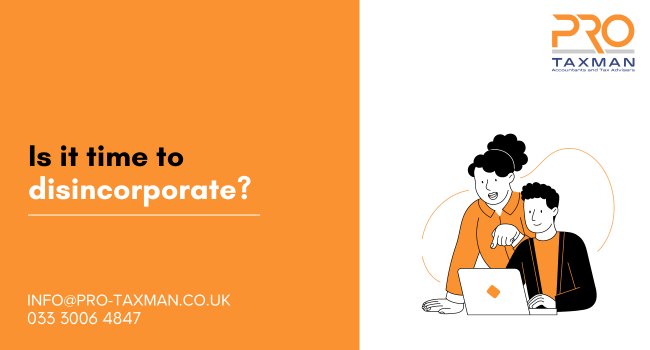On 26 October 2023 one of the most significant pieces of company legislation came into being. The main thrust of the Economic Crime and Corporate Transparency Act 2023 is to ‘prevent companies and others from carrying out unlawful activities, or facilitating others to carry out unlawful activities‘. New obligations are to be imposed on companies that may be of particular concern to directors of micro-companies (currently companies that have a turnover of £632,000 or less or £316,000 or less on theirbalance sheet).
The Act now requires all companies to file accounts showing key information such as the profit or loss account as well as the balance sheet. This information will be available on the public register for all to view. Those directors who are uncomfortable with this disclosure may want to consider disincorporation as a means of keeping the business going but under self employment rather than via a company.
Disincorporation involves the transfer of the assets and liabilities of a company (i.e. goodwill, property, plant and machinery, stock and creditors) as a going concern to the shareholder(s), who then continue the business in an unincorporated form (sole trader or partnership).
Particular attention must be paid to capital gains. The transfer of chargeable assets will be a connected party transaction, using market value to compute the gains. However, in the absence of a third-party sale, the company will have no proceeds with which to pay the corporation tax and this fact may influence the process. If the company does need funds, this will almost certainly force the proprietor to buy the assets from the company. As a point of note – the payment does not need to be the full market value (even though this will be used to calculate the gain); it only has to be sufficient to leave the company with adequate resources to pay the tax. Be aware that where the proprietor buys the business at an undervalue, the excess of market value over the actual consideration paid is treated as a distribution taxed on the proprietor at their highest rate of income tax.
Alternatively, if the company has enough cash to pay the tax, the business can be distributed to the shareholders with no cash being transferred. Such a situation is a distribution and again the proprietor is taxed at their highest rate of income tax on the grossed-up value of the business transferred. Note that there is a double charge here: the company has a liability on its gains (as well as on any trading profit on the cessation of its trade) and the sole trader/partnership proprietor has a liability on the receipt of the business.
Other points
Any cash remaining in the business can be withdrawn as a dividend, again taxed at the proprietor’s highest tax rate.
As the company is ‘connected’ to the purchaser and the trade is continuing, the deemed ‘market value’ rule also applies to the transfer of closing stock and any plant and machinery. However, an election can be made for the transfer to be at actual transfer value for stock and at written-down value (or, if higher, the book value) for plant and machinery instead.
No writing down allowances are given on plant and machinery in the final basis period, and a balancing adjustment is calculated.
As a general rule, when a trade ceases, the VAT registered person is deemed to make a taxable supply of goods held by the business. However, there should be no VAT on the transfer by virtue of the ‘transfer of going concern’ provisions. To avoid any delays in obtaining a new VAT registration, consider electing to continue using the business’s existing VAT registration number.
Practical point
It is anticipated that many of the measures introduced by the Act will require secondary legislation and Companies House guidance, as well as the development of Companies House systems to implement the changes. As such, it will likely be at least a year until many of these provisions are implemented.
Need professional accounting service or tax advice? Contact us to book a 15-min Free Consultation with us today.
To find out more please follow us on Facebook, Twitter, or LinkedIn. Feel free to contact us on 0333 006 4847 or request a call back by texting 075 6464 7474

